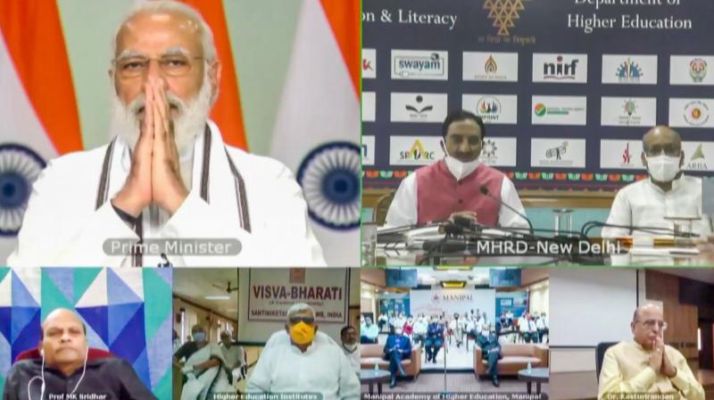New Delhi: Addressing the ‘Conclave on transformational reforms in higher education under National Education Policy’, on Friday, Prime Minister Narendra Modi expressed his satisfaction that no section of the society claimed that the policy was ‘biased’ which is a substance of contentment.
He said that the New Education Policy (NEP) 2020 focuses on ‘how to think’ not ‘what to think’, adding that it has led the foundation of the new India of the 21st century.
Meanwhile, PM Modi revealed that the NEP was approved after extensive discussions over three to four years and deliberation over lakhs of suggestions.
Perhaps, people from different fields and ideologies are reviewing the policy and calling it a “healthy debate”, saying it will be beneficial for the education system of India.
“Our education system focused on ‘What to think’ so far. New policy emphasises on ‘How to think’. There’s no dearth of information and content in the time in which we’re today. The effort is to lay emphasis on inquiry based, discovery based and analysis-based ways to help children learn,” said PM Modi.
Further, he added that, the NEP 2020 is aimed at keeping India’s present and future generations ‘future ready’, every country goes ahead by connecting its education system to its national values and reforming it as per its national goals.
Taking a jibe at the previous government, the Prime Minister said that there were no major changes in India’s education policy in the past few years which caused the society “to encourage herd mentality, instead of curiosity and imagination”.
“Changing times has given rise to a new global system. A new global standard is rising. It was essential that India changed its education system as per this. Creating a 5+3+3+4 curriculum, while moving ahead from the school curriculum’s 10+2 structure, is a step in this direction,” he added.
Here are some key takeaways:
– National Education Policy was approved after extensive discussions over 3-4 years and deliberation over lakhs of suggestions: PM Modi
– National Education Policy is being discussed across the nation today. People from different fields & ideologies are giving their views & reviewing the Policy. It’s a healthy debate. The more it is done, the more it will be beneficial to the education system of the country
– Every country goes ahead by connecting its education system to its national values & reforming it as per its national goals. It’s aimed at keeping its present & future generations ‘future-ready’
– Our education was focused on herd mentality instead of curiosity and creativity
– Our education, if lacking in philosophy, purpose of education, how can it inculcate critical thinking, innovation?
– National Education Policy is based on a holistic approach, instead of parts
– Changing times has given rise to a new global system. A new global standard is rising. It was essential that India changed its education system as per this. Creating a 5+3+3+4 curriculum, while moving ahead from school curriculum’s 10+2 structure, is a step in this direction
– India’s education system needed to be modified to be at par with a new global standard. But focus must also remain on being rooted to one’s native
– If children are taught in their mother tongue, their speed of learning in much higher and their base will be stronger
– Our older education focused on ‘What to think’, while the new National Education Policy will focus on ‘How to think’
– Information is available readily but what to study is the biggest question
– If focus is shifted away from a big syllabus and hefty text books, education can be more centralised towards discussion, analysis
– The new NEP will also allow students to follow passions. They will be able to drop streams, go for multiple entry and exits under the credit system, It will allow them to move towards the era where people do not just stick to one profession throughout their lives. We must re-skill and up-skill
– The NEP addresses dignity of labour
– It is India’s responsibility to combine technology with talent to produce expertise
– More focus on lab experiments, not just studying and institutions must also focus on infrastructure
– Teachers and dignity of teachers has been given emphasis in this policy, because the role of teachers in education must be recognised as essential and central.
(Aditya)

